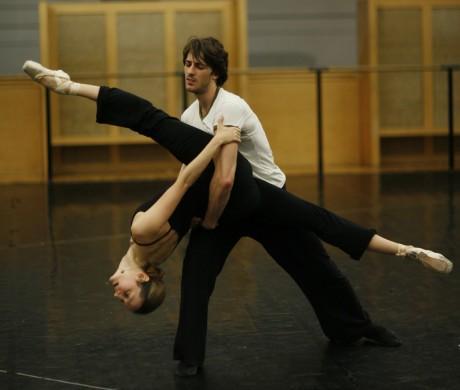Advertisement
'La Danse' Goes Backstage With Paris Opera Ballet
Master documentary filmmaker Frederick Wiseman used to sneak in to see the ballet when he was a young law student in New York City. Wiseman quickly became fascinated with "this beautiful form, which is so evanescent, so ephemeral and all the work that goes into it — and it's over in a flash," he told Here & Now host Robin Young in an interview earlier this month.
Wiseman eventually dropped law for a career in film-making and became known for immersing himself in institutions that he documents, such as the Massachusetts Correctional Institution at Bridgewater in his 1967 film "Titicut Follies." His interest in dance first found its way onto film in 1995, with the film "Ballet," which focused on the rehearsals and coaching that dancers went through at the then-cash-strapped American Ballet Theatre.
But in "La Danse," his 38th and latest film, Wiseman wanted to bring his camera backstage at a "very different" company. "The Paris Opera Ballet has existed for 300 years, it gets a subsidy from the state, it has a long tradition" that brings it to an entirely different level than American ballet companies, Wiseman said.

And that is quickly revealed in "La Danse," where we see scene after scene of former Paris Opera Ballet greats passing on steps and nuances in dancing that they were taught, and that their teachers taught them in a lineage that goes back to King Louis XIV.
Some of the coaching is tough, as when off-screen ballet masters tear into some male dancers for limp turns, sagging legs and crooked lines in a rehearsal on stage. Other coaching scenes are comical, such as when former stars Pierre Lacotte and his wife Ghislaine Thesmar quibble about how the willowy dancer they're watching in rehearsal "never bends," and which ballet dancers had the best technique or a "big butt."
But throughout the film, some of the most breathtaking coaching comes from recently retired superb dancer Laurent Hilaire. He explains to one dancer why she needs to make the small shapes her arms are making "more generous," so that her movements are "not just for herself" but "for those who are watching you."
He rehearses a rising star in "Medea," a ballet that unfortunately ends with two children being splattered by blood-red paint, by dancing the steps of the ballet alongside her, as he talks through why her character crouches in fear or lets "destiny" escape from her fingertips.
What we see is not only what makes the Paris Opera Ballet great, but also how meaning is achieved and communicated in dance.
Also notable in the film is Paris Opera Ballet's formidable artistic director Brigitte Lefevre, a former company dancer herself, who is captured in meeting after meeting defending the company with a kind of chic ferocity. She deftly deflects the demands of American fundraisers who want to traipse "big benefactors" through a rehearsal studio, and firmly but gently counsels struggling dancers and confused choreographers.
She's not joking when Wiseman catches her saying a dancer is "half nun, half boxer." How funny, then, that Wiseman's next film will be about boxing, because it's "about people who have to control all aspects of their body for their work."
Interestingly, the question that Wiseman gets most often about "La Danse" is: Who is the beekeeper he stumbles upon and films on the roof the the Paris Opera Ballet building? Like the rest of the film, the brief scene is not narrated — we're not told who he is and why he's doing there, he's just there, like the grand Palais Garnier itself and the ballet dancers who've long toiled in the studios below.
Wiseman let Here & Now in on the story. He's a retired stagehand who used to raise bees in the country during his working years, but who no longer has the space for it so the Opera lets him keep his bees on the roof. Should you have the luck to be in Paris to see the ballet, you can also buy his honey in the company store.
This program aired on December 18, 2009. The audio for this program is not available.